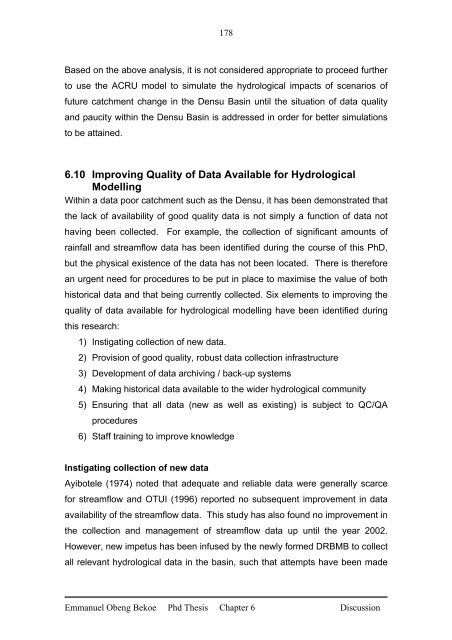PhD Thesis Emmanuel Obeng Bekoe - Cranfield University
PhD Thesis Emmanuel Obeng Bekoe - Cranfield University
PhD Thesis Emmanuel Obeng Bekoe - Cranfield University
You also want an ePaper? Increase the reach of your titles
YUMPU automatically turns print PDFs into web optimized ePapers that Google loves.
178<br />
Based on the above analysis, it is not considered appropriate to proceed further<br />
to use the ACRU model to simulate the hydrological impacts of scenarios of<br />
future catchment change in the Densu Basin until the situation of data quality<br />
and paucity within the Densu Basin is addressed in order for better simulations<br />
to be attained.<br />
6.10 Improving Quality of Data Available for Hydrological<br />
Modelling<br />
Within a data poor catchment such as the Densu, it has been demonstrated that<br />
the lack of availability of good quality data is not simply a function of data not<br />
having been collected. For example, the collection of significant amounts of<br />
rainfall and streamflow data has been identified during the course of this <strong>PhD</strong>,<br />
but the physical existence of the data has not been located. There is therefore<br />
an urgent need for procedures to be put in place to maximise the value of both<br />
historical data and that being currently collected. Six elements to improving the<br />
quality of data available for hydrological modelling have been identified during<br />
this research:<br />
1) Instigating collection of new data.<br />
2) Provision of good quality, robust data collection infrastructure<br />
3) Development of data archiving / back-up systems<br />
4) Making historical data available to the wider hydrological community<br />
5) Ensuring that all data (new as well as existing) is subject to QC/QA<br />
procedures<br />
6) Staff training to improve knowledge<br />
Instigating collection of new data<br />
Ayibotele (1974) noted that adequate and reliable data were generally scarce<br />
for streamflow and OTUI (1996) reported no subsequent improvement in data<br />
availability of the streamflow data. This study has also found no improvement in<br />
the collection and management of streamflow data up until the year 2002.<br />
However, new impetus has been infused by the newly formed DRBMB to collect<br />
all relevant hydrological data in the basin, such that attempts have been made<br />
<strong>Emmanuel</strong> <strong>Obeng</strong> <strong>Bekoe</strong> Phd <strong>Thesis</strong> Chapter 6 Discussion

















